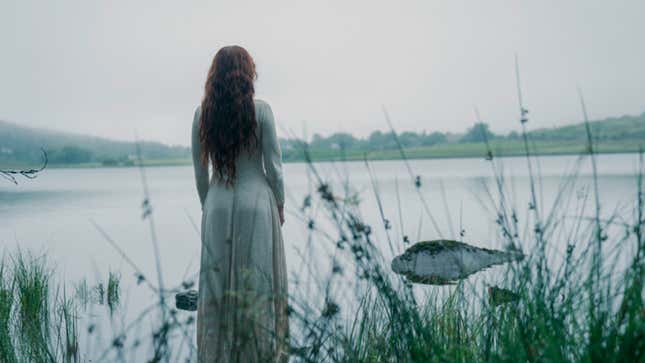House of the Dragon, HBO’s Game of Thrones spin-off based on the 2018 novel Fire & Blood, is nearly done with its second season. The war between the Greens (Alicent Hightower and her Targaryen children) and the Blacks (Rhaenyra Targaryen and her supporters) kicked off at the end of the first season, and it hasn’t yet swung into full gear, even though there’s only one episode left. Some viewers have complained about the pacing, unhappy with watching Daemon (Matt Smith) trapped in this universe’s version of Luigi’s Mansion for hours, or frustrated with how the war keeps almost bubbling over just to pull back at the last second. But despite its pacing issues, this season has been powerful and potent, and serves as a reminder that House of the Dragon is an incredibly creative (and intriguing) adaptation.

See, Fire & Blood isn’t like George R. R. Martin’s mainline Game of Thrones books—its chapters don’t flit between different characters’ perspectives, and it reads more like a history tome than a novel. As such, though there are key moments in Targaryen history that the series has to engage with, there’s ample room for creative liberties to be taken with the source material. The characters in Fire & Blood are more historical figures than fleshed-out human beings—we don’t know their inner thoughts or what drives them, so the series and its actors have to fill these empty vessels with substance. What they’ve done is endlessly fascinating to me.
Naturally Rhaenyra (Emma D’Arcy), named heir by her father in a break from patriarchal tradition that caused an uproar, would lament not being born a man, and would make traditionally masculine decisions in her quest for power. Naturally there would be the hint of a sapphic relationship between her and Alicent (Olivia Cooke), the latter of whom struggles with her identity after pledging her life to serve in a more traditional feminine (read: sexist) manner. Naturally the young sons of an old king would fight tooth-and-nail for his attention and the attention of the realm, laying waste to everything and treating war like a board game with no real-world consequences in an effort to unseat a woman who dares to ascend the throne. Naturally Daemon, a man who always longed for the crown, would conspire to take it from his own wife because he can’t stomach the notion of a woman (especially his) having it instead of him. Naturally the smallfolk of the Seven Kingdoms, after enjoying decades of peace, would revolt during wartime famine after Rhaenyra cleverly stokes the flames of their anger. None of these things are explicitly mentioned in the book, yet it all feels right playing out on-screen.
There are so many interesting themes woven into this series, so many inspired creative decisions, that it’s clear House of the Dragon could only be successfully made by those who obsessively read between the lines of the source material and imbued it with added meaning and intent. Yes, Martin is involved in this series, but it’s unclear to what extent—I’d like to think he sat showrunners Ryan Condal and Miguel Sapochnik down and made them watch his very own version of Tom Cruise’s six-hour film school video, because this show just gets it.

The love and reverence for the somewhat dry source material is exemplified in the most recent episode, in which Alicent takes a day trip to the Kingswood to escape the suffocation of the Red Keep. She strips down to her undergarments and wades out into a river where she floats languidly on her back, her eyes cast upward. For a moment, it seems like she might end her life here—after all, her attempts to serve the realm as a dutiful wife and mother have led to her horrendous sons wreaking havoc, and stripping her of what little power she had. But when a hawk lazily spirals overhead, it seems like she has a moment of clarity, and turns to swim back to shore. In the preview for the season two finale, she tells Aemond he brings nothing but “ruin and death” to the Seven Kingdoms. Perhaps she’s determined to right the wrongs she has set in motion. Unfortunately, once men get war on their minds and blood on their hands, it’s nigh impossible to stop them.
Though this season has occasionally dragged on, I think this is both a natural side effect of adapting somewhat simplistic source material, and an example of the showrunners doing us a solid. If you’re familiar with Fire & Blood, you’ll know that this war does not end well for anyone. If you’re not familiar with it, I’d suggest you don’t get attached to anyone. Delaying the inevitable (there were two years between seasons one and two, so expect at least that before we get season three) just means we have a little bit of time to prepare ourselves for how truly awful this is going to get. I can’t wait to see how they pull it off.


